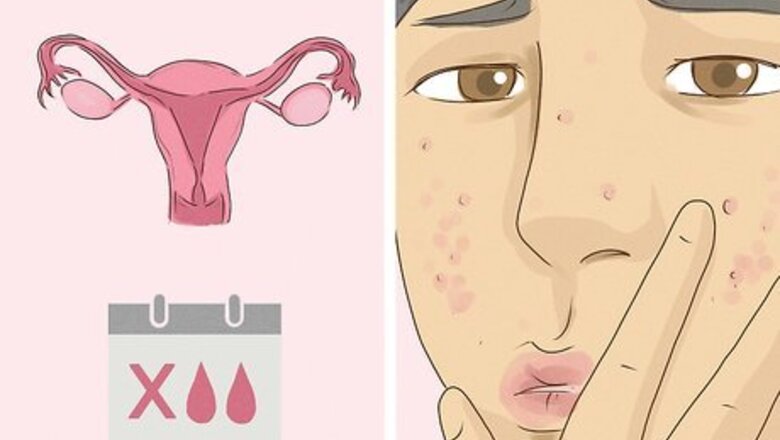
views
Identifying PCOS Depression
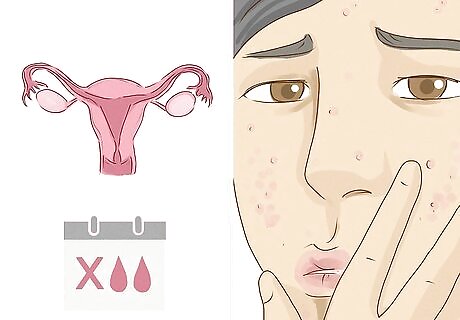
Look for symptoms of PCOS if you don’t have a diagnosis. You might suspect you have PCOS if your period is irregular, which is often the main symptom of PCOS. You’re more likely to have PCOS if you’re overweight, but anyone can have it. Talk to your doctor if you have the following symptoms of PCOS: Irregular or absent periods Excess facial or body hair Severe acne Hair loss around your temples or the crown of your head Ovarian cysts, which may feel painful
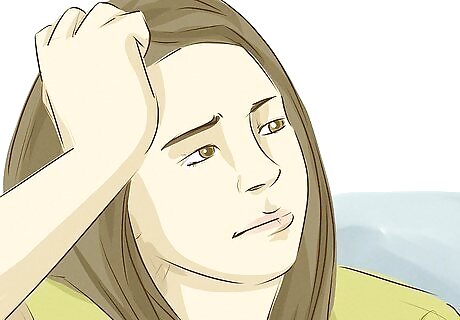
Notice if you’re feeling sad, hopeless, empty, guilty or anxious. Name the feelings you’re experiencing, and keep a mood journal to track how often you’re feeling down. It’s normal to occasionally have a bad day. However, persistent feelings of sadness, hopelessness, emptiness, guilt, or anxiety might be a sign of depression. For example, you might realize that you feel sad most days even when you have a reason to feel happy. Similarly, you might feel really guilty even though you haven’t done anything wrong.
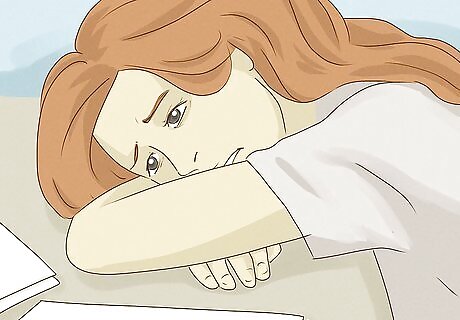
Pay attention if you experience extreme fatigue and loss of interest. Depression can be more than feeling sad or empty. It also causes you to feel exhausted and disinterested in your life. Consider if you’ve been feeling run down and unable to enjoy things that typically make you happy. This might be a sign of depression. As an example, you might be too exhausted to go out with friends, engage in a hobby, or play with your pet. Fatigue can also be a sign of a medical condition, so see your doctor to rule out other potential causes.Did You Know? You may be depressed even if you don’t feel sad. Feeling exhausted and not being able to enjoy your favorite things can be your only symptoms of depression.
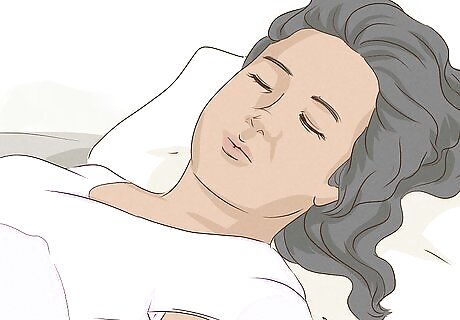
Notice if you’re sleeping too much or too little. Depression may make you feel like you need to sleep all the time, especially if you’re fatigued. On the other hand, you might have insomnia that keeps you awake all night. Talk to your doctor to find out if your sleep issues might be related to PCOS depression. For instance, you might find yourself lying awake all night even though you’re exhausted or you may find that you’re always tired no matter how much sleep you get. Your doctor can rule out medical causes of sleep issues so that you can start getting better sleep.
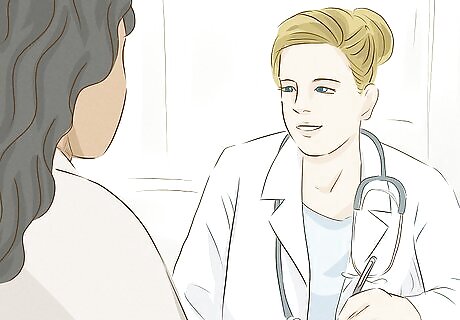
Ask your doctor for a screening if you suspect you’re depressed. Depression is a serious medical condition, and treatment is available. Talk to your doctor if you think you might be depressed. They’ll ask you a set of diagnostic questions to determine if you might have depression. Then, they’ll offer you treatment recommendations. Your doctor might refer you to a therapist for an official diagnosis and further treatment.Tip: Typically, PCOS depression occurs because your hormones are imbalanced. However, you might also feel depressed because your PCOS symptoms, like hair loss or excess body hair, affect your self-esteem. That means your doctor may recommend you take steps to balance your hormones and cope with your feelings.
Managing Your Hormones
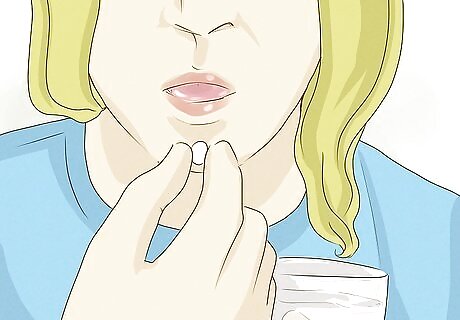
Take the medications your doctor prescribes to treat your PCOS. PCOS involves hormonal fluctuations, which can contribute to your depression. Balancing your hormones may improve your mood, so take your medication as directed by your doctor. This may help treat your depression as well as your other PCOS symptoms. For instance, your doctor might prescribe oral contraceptives and spironolactone to manage your hormones. While oral contraceptives can balance estrogen and progesterone, spironolactone reduces the affects of the hormone androgen on your skin, so might get rid of acne and excess hair growth. Additionally, they may prescribe metformin to treat insulin insensitivity. If necessary, they’ll offer supplemental treatments for individual symptoms, like excess facial hair.
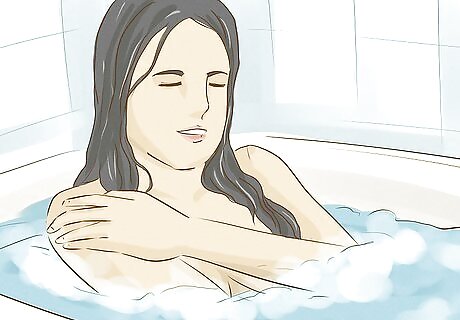
Find an outlet to relieve stress because it causes hormone fluctuations. Stress is a normal part of life, but too much stress can be harmful. Stress releases hormones like cortisol that can cause weight gain or may trigger your depression. To keep your stress levels in check, choose coping strategies that help you deal with stress. Then, incorporate them into your daily routine. For instance, go for nature walks, play with your pet, vent to a friend, color in an adult coloring book, do something creative, read, soak in a warm bath, or write in a journal.
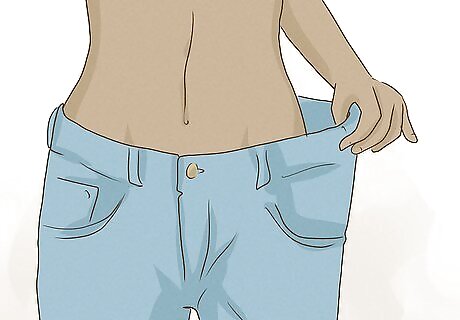
Lose weight if you’re carrying extra body weight. Women with PCOS who have higher BMIs are more likely to have depression when compared to women with PCOS who have a lower BMI. Talk to your doctor to find out if you have weight to lose. Then, reduce your calorie intake and increase your activity level to help you lose weight. Check with your doctor before making diet or exercise changes. Also, don’t assume that you need to lose weight without talking to your doctor because you can have PCOS without being overweight. Ask your doctor to refer you to a dietitian, who can help you design a diet plan that works for you. It may be harder for you to lose weight with PCOS, but it’s still possible. If you’re having trouble losing weight, talk to your doctor to find out what you can reasonably expect to lose and to get advice for losing weight successfully.Did You Know? If you’re considered overweight or obese, losing weight may be enough to balance your hormones. Talk to your doctor to find out if this might be true for you.
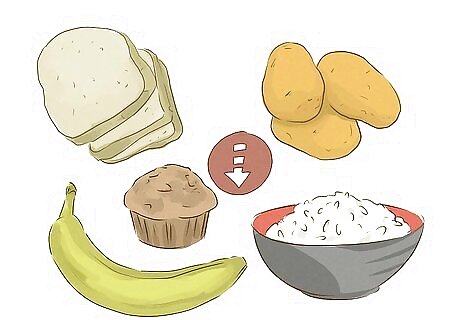
Reduce carbohydrates to help manage your insulin levels. High levels of insulin in your blood can contribute to your depression. To manage your insulin levels, eat a low carb diet to avoid spiking your blood sugar. Additionally, choose complex carbs like whole grains and starchy veggies over simple carbs like baked goods, bread, and processed foods. Talk to your doctor to set a daily carb goal that’s right for you. For instance, you might limit your carbs to 60 grams per day, such as 10-15 grams of carbs at each meal.
Making Lifestyle Changes
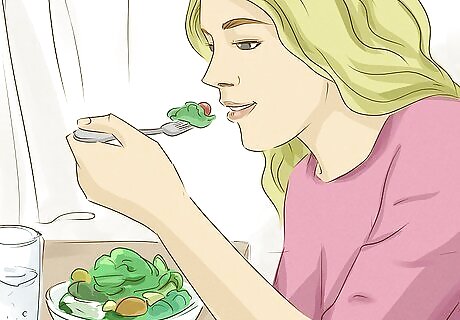
Practice self care so your needs are met. Taking good care of yourself is essential for treating your PCOS depression, but it might feel really hard right now. Make a list of the essential things you need to do for yourself, like eating healthy meals, bathing, sleeping, and cleaning your living space. Check off each item to help you stay on track. Additionally, do something nice for yourself every day to help you feel better. For example, you might buy pre-made healthy meals from the grocery store and you might do the bare minimum to keep your living space neat. Nice things you might do for yourself include getting your favorite coffee drink, writing down a new affirmation, spending time on a hobby, or taking a nice bath.
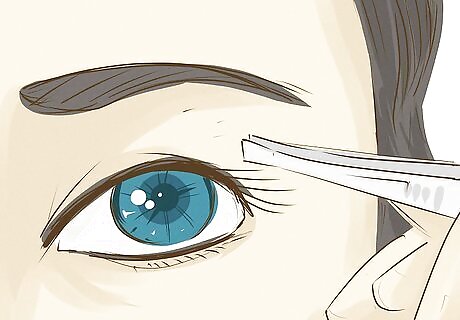
Remove excess facial and body hair if it bothers you. Most women have some amount of facial and body hair, so try not to let your excess hair get you down. You likely notice it more than other people. If the hair bothers you, choose a hair removal method to get rid of it. Shave, wax, or use a hair removal cream to remove the bothersome hair. If you have a small amount of excess hair, use a pair of tweezers to pluck out each hair. If you want a more permanent solution, talk to your dermatologist about getting laser hair removal.
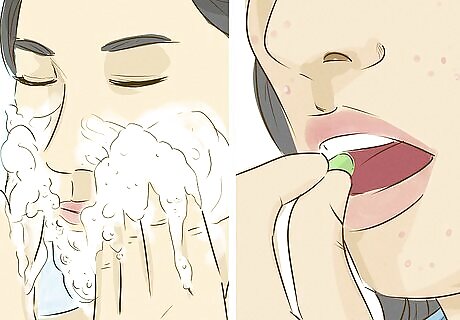
Treat your acne to help your skin clear. Everyone experiences acne, so try not to feel down if your PCOS causes acne. However, it’s common for women with PCOS to feel self-conscious about their acne. To help clear your skin, wash your face twice a day with a mild cleanser and apply an acne cream to your pimples. Additionally, talk to your doctor or dermatologist about additional treatments you can try. Your doctor may give you an antibiotic to treat acne deep under your skin. It may take 6-8 weeks for a new acne product to start working, so be patient and keep applying the product.

Eat 4-6 small, healthy meals spread throughout your day. Eating small meals throughout the day can help manage your blood sugar and your mood. Additionally, it helps you avoid disordered eating patterns that can lead to either restriction of calories or binging. Schedule 4-6 meals small meals every 2-3 hours to keep your blood sugar levels stable. Additionally, build your meals around fresh produce and lean protein. Generally, aim to eat about half of what you’d normally eat at mealtimes but eat more often.
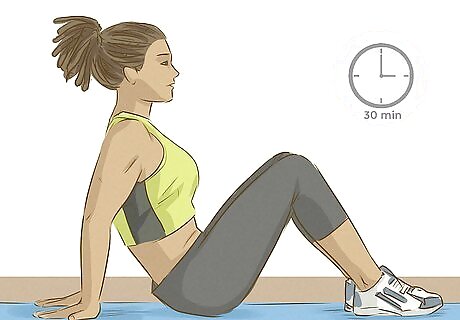
Exercise for 30 minutes a day to improve your mood and metabolism. Exercise releases hormones that help you feel happier, so it might help relieve your depression. Additionally, exercise helps your body maintain its metabolism, which might help with your PCOS symptoms in general. Schedule 30 minutes of moderate exercise into your daily schedule to help you feel better. Pick an exercise that you enjoy so it’s easy to stick to your goal. For instance, go for long walks, play a recreational sport, join a gym, take a dance class, or start running.
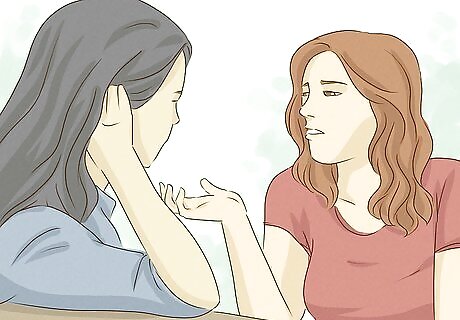
Connect with other women who have PCOS for support. Dealing with PCOS can be really hard, but support is available. Look for a support group in your area or connect with others online. Talk about your struggles and listen to what others have to say. You might get advice from people who’ve been in your place. Ask your doctor about groups that meet in your area or search for a group online. Having someone who understands what you’re going through might help you feel better.
Getting Medical Treatment
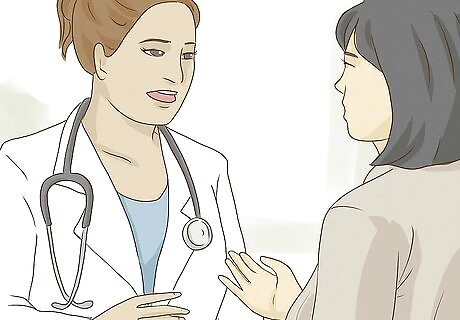
Discuss your depression with your doctor. Depression is a medical condition, so sometimes it requires medical treatment. Additionally, you might benefit from talking to a therapist. Talk to your doctor to figure out which treatments meet your needs. Ask your doctor to refer you to a therapist for counseling.
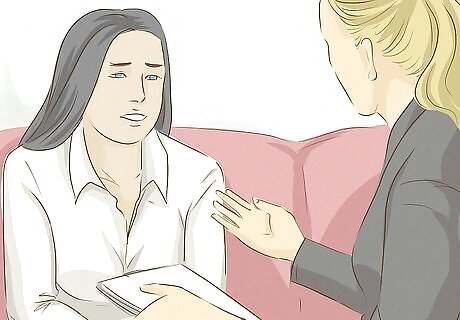
Work with a therapist to process your feelings and change your thoughts. Your therapist will help you work through your emotions and build your self confidence, which might help with PCOS depression. Additionally, they’ll help you change the thoughts and behaviors that are contributing to your depression. Get a referral from your doctor or look for a therapist online. Your counseling sessions may be covered by insurance, so check your benefits.
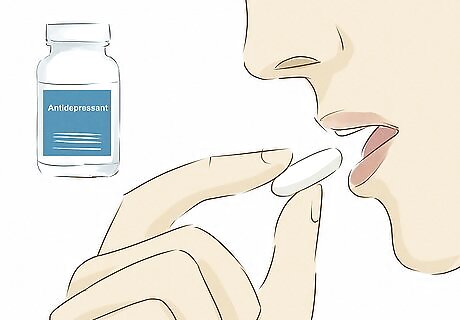
Ask your doctor if an antidepressant is right for you. An antidepressant may help treat your depression by balancing the chemicals in your brain. Your doctor can talk to you about the risks and benefits of taking an antidepressant. Discuss this treatment option with your doctor so you can decide if it’s right for you. Sometimes taking an antidepressant is the best treatment for your depression. If your doctor prescribes you an antidepressant, don’t stop taking it without talking to them first. Antidepressants can cause side effects. These include nausea, increased appetite, weight gain, insomnia, fatigue, dry mouth, constipation, dizziness, agitation, anxiety, and low libido. Not everyone experiences these side effects, and they may go away over time. Talk to your doctor if you notice any side effects that concern you.

















Comments
0 comment